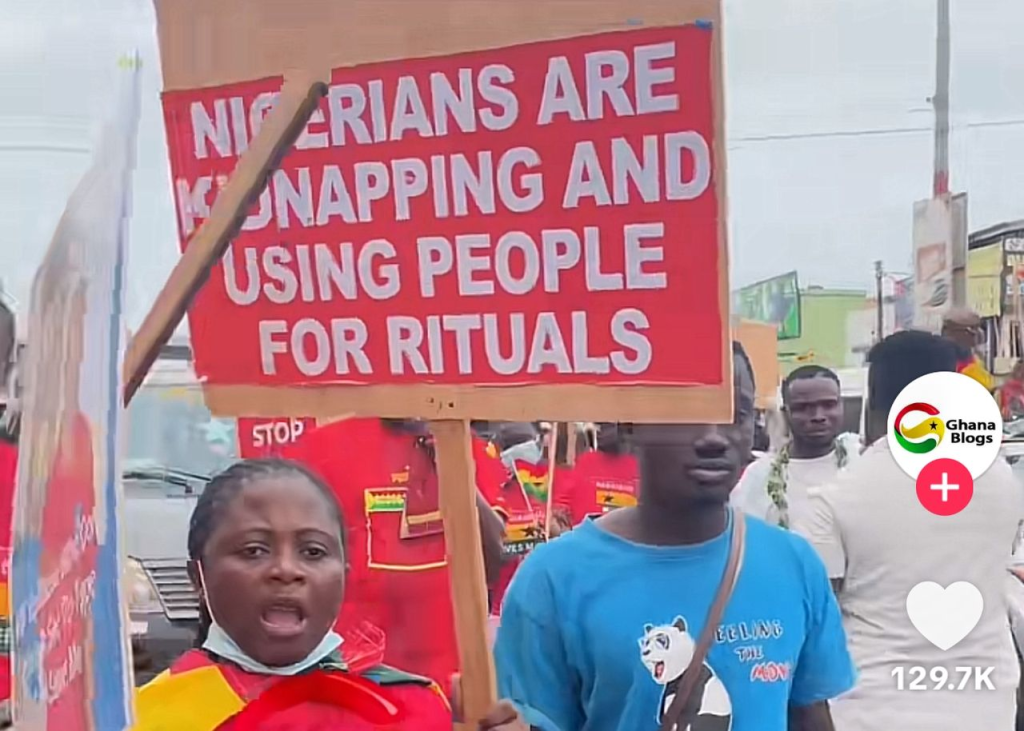By Olayinka Ajayi
Former Nigerian Ambassador to the United States, Ambassador Joe Keshi, has urged Nigerians living in Ghana to respect local laws and cultural norms as tensions rise over recent “Nigeria Must Go” protests in Accra.
The protests, reportedly driven by complaints from local traders about Nigerian-owned businesses dominating retail spaces, have reignited long-standing sensitivities between the two West African neighbours.
Keshi, in a chat with Sunday Vanguard, commended President Bola Tinubu’s administration for resolving the rift but warned that the conduct of some Nigerians abroad can aggravate local resentment.
His words:“The issue is a bit complex because of the number of factors involved. It is a long-standing resentment towards Nigerians.
“The anti-Nigerian sentiment played out in Ghana, but the Federal Government has been working behind the scenes to manage it. Unfortunately, some Nigerians running businesses on the streets of Ghana behave badly.”
He noted that such actions can alienate host communities, especially when local traders feel displaced.
“You have displaced Ghanaians running businesses on the streets, and yet you flaunt your wealth. If you are in Rome, you behave like a Roman. Nigerians should learn to conduct themselves wherever they find themselves because you can’t go to the United States and behave like this,” Keshi added.
He urged Nigerian leaders and diaspora associations to educate citizens on responsible conduct, warning that economic displacement often breeds hostility.
Keshi also called on Ghanaians to avoid overreacting, stressing that cultural and historical ties between the two nations should foster unity rather than division.
“Somebody should educate Ghanaians that they are overreacting, especially as their President has a cultural affiliation with Nigeria,” he said.
Recalling past hostilities, Keshi remarked:“It was Ghana that started the expulsion of Nigerians in Ghana.”
Tension
The latest tension began in late July when hundreds of Ghanaian traders staged demonstrations in Accra and Kumasi, carrying placards reading “Nigeria Must Go.” Protest organisers accused some Nigerians of dominating the retail trade, flouting Ghana’s investment laws, and engaging in illicit activities, including fraud and unlicensed street vending.
The Ghana Union of Traders Association (GUTA) had long lobbied for stricter enforcement of laws restricting foreigners from operating in certain segments of the retail market. Many protesters claimed their livelihoods were being undermined by Nigerian traders with more capital and cross-border supply networks.
Social media further inflamed tensions, with viral but unverified allegations of ritual killings, prostitution rings, and aggressive land acquisitions by Nigerian nationals. These narratives stirred public anger, recalling historical grievances.
Ghana’s President John Mahama moved swiftly to calm fears.
Addressing the public, he assured that there would be “no space for xenophobia” in Ghana and reaffirmed the “brotherly ties” between both nations. Mahama stressed that while trade laws must be respected, violence and discrimination against Nigerians or any foreign nationals would not be tolerated.
On the Nigerian side, President Tinubu dispatched a special envoy led by Minister and former ambassador Bianca Ojukwu to Accra.
Ojukwu reported that tensions had subsided since the peak of the protests, praising the Ghanaian government for effective crowd control and mediation. She also urged both governments to strengthen the Nigeria–Ghana Joint Commission as a platform for resolving trade disputes and addressing misinformation.
Fragile
The relationship between Nigeria and Ghana has experienced cycles of cooperation and conflict.
In 1969, Ghana expelled thousands of Nigerians under the Aliens Compliance Order.
Nigeria retaliated in the early 1980s, expelling more than a million Ghanaians in 1983 and a further 300,000 in 1985 during economic downturns.
The phrase “Ghana Must Go” entered popular culture during that era, even lending its name to the woven bags used by migrants.
Since then, both countries have worked to strengthen ties through ECOWAS, bilateral agreements, and cultural exchange. However, trade disputes and migration pressures have periodically rekindled old tensions—most recently in 2019, when Ghanaian authorities closed over 600 Nigerian-owned shops for alleged non-compliance with investment laws.
Reactions
Nigerian community leaders in Ghana have urged calm, calling on members to engage in dialogue with local authorities. The Nigerian Union of Traders Association Ghana (NUTAG) issued a statement rejecting criminal allegations against its members and emphasising their contributions to Ghana’s economy through taxes and job creation.
Human rights groups, including Amnesty International Ghana, have warned against allowing the protests to escalate into targeted violence. They have called for transparent investigation of any alleged crimes and fair enforcement of trade regulations, regardless of nationality.
Misinformation
The current flare-up underscores how economic competition, historical grievances, and misinformation can combine to strain cross-border relations. Both Nigeria and Ghana are key players in West Africa’s push for regional integration, yet domestic pressures often complicate that vision.
At the same time, governments must act quickly to dispel dangerous narratives and prevent political opportunism from exploiting public fears.
As calm gradually returns, observers have called for rebuilding of trust. This is expected to be achieved through sustained dialogue, enforcement of fair trade practices, and mutual respect between citizens.
For both countries, managing this episode successfully will test their commitment to the ideals of ECOWAS and the African Union.
The post Some Nigerians in Ghana behave badly, displace Ghanaian businessmen, flaunt wealth — Amb Keshi appeared first on Vanguard News.

